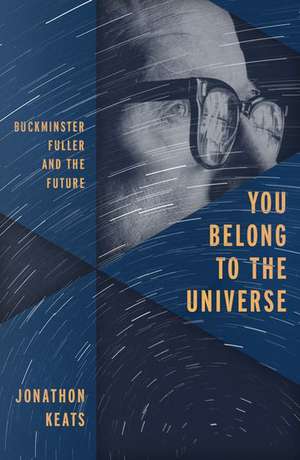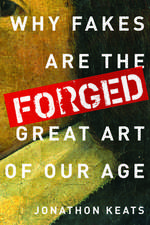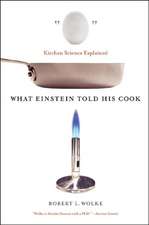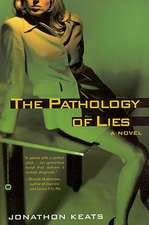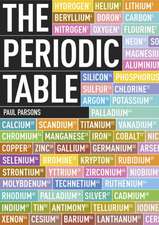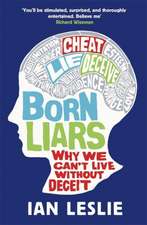You Belong to the Universe: Buckminster Fuller and the Future
Autor Jonathon Keatsen Limba Engleză Hardback – 12 mai 2016
Preț: 216.07 lei
Nou
Puncte Express: 324
Preț estimativ în valută:
41.34€ • 43.28$ • 34.21£
41.34€ • 43.28$ • 34.21£
Carte disponibilă
Livrare economică 15-29 martie
Preluare comenzi: 021 569.72.76
Specificații
ISBN-13: 9780199338238
ISBN-10: 019933823X
Pagini: 216
Dimensiuni: 145 x 211 x 23 mm
Greutate: 0.32 kg
Editura: Oxford University Press
Colecția OUP USA
Locul publicării:New York, United States
ISBN-10: 019933823X
Pagini: 216
Dimensiuni: 145 x 211 x 23 mm
Greutate: 0.32 kg
Editura: Oxford University Press
Colecția OUP USA
Locul publicării:New York, United States
Recenzii
This ought to be a profoundly wrong-headed book, judging one man's ideas against the entire recent history of Spaceship Earth. But You Belong to the Universe says more about Fuller and his future in a few pages than some whole biographies.
illuminating book
Readers coming for an illuminating biography of one of technology's most colourful characters won't be disappointed. What they'll get as well though is a primer in a way of thinking about innovation that warrants a revival.
Keats's timely book challenges each of us to become comprehensive anticipatory design scientists, providing the necessary tools for continuing Fuller's legacy of improving the world
Reviews from US edition A wonderfully written and highly necessary book about one of the 20th century's most enigmatic outliers.
Brilliantly challenging Buckminster Fuller's self-mythologizing by putting Fuller's life and ideas in their historical context, Jonathon Keats is all the more able to identify the ways of thinking that were truly original in Fuller's own time, and the concepts that can address today's environmental and technological dilemmas. Keats's sympathetic but firm critique of Fuller, and his own suggestions for the human future, make this book a must for Fuller enthusiasts and skeptics alike -- in fact, for everyone aspiring to think outside the dome.
Jonathon Keats audaciously tackles the grandiose Buckminster Fuller, debunking Fuller's legend while extending his inventive thinking for our present day. Sometimes it takes a real visionary to know one.
I loved reading Jonathon Keats's fascinating book on one of my favorite thinkers and optimists, Buckminster Fuller. Keats illuminates how Fuller's daring mind predicted the Internet, MOOCs, Netflix, and much more. Even if some of his ideas didn't work out, it's so refreshing to inhabit Fuller's insatiably curious mind that truly believed we could design ourselves into a better future.
R. Buckminster Fuller was born in privilege, educated by experience and his own intuition, and created his own myth. Along the way he enriched human existence with inventions such as the geodesic dome and revolutionary concepts about peace and our place in the environment. Jonathon Keats has done a superb job of distinguishing fact from legend and refocusing our attention on Fuller's thoughts and perceptions. The work of a remarkable man has yielded a remarkable book.
Keats' excellent book on Buckminster Fuller recalls a remarkable life in engineering and beyond, an underestimated and underappreciated life. Fuller's tale reminds us that the future is best predicted by those who invent it.
Was Buckminster Fuller a dreamer, a genius, or a deluded crackpot? In his fascinating book Jonathon Keats shows that Fuller was all three -- and that his vision of a design-driven global ecosystem in which humans live harmoniously with nature is more pertinent now than ever before. More than just a biography of the man and his ideas, Keats's book is an inspiring call to action.
Buckminster Fuller is perhaps one of the most unrecognized visionaries of the 20th Century. In You Belong to the Universe, Jonathon Keats unpacks the many eccentric details of Fuller's life, and explores the implications of Fuller's designs and blueprints for a better society ... Keats presents an interesting look at the way innovation has transformed from Fuller's day into the energy and cost-saving practices that are being explored today.
Like his formidable intellect, Fuller's self-mythology was an elastic tool he stretched to suit the audience and the occasion at hand. In vivid prose that details all of Fuller's eccentricities and achievements, Keats strips away the icon's layers to reveal a truer, even more fascinating portrait of the 20th century genius.
If Fuller is better known for objects than ideas, that's partly because of the complexity of how he thought ... It's a reflectiveness that's present in the book, which is a fascinating read.
It's become cliché for people in tech to say they want to make the world better. But Fuller meant it. In You Belong to the Universe: Buckminster Fuller and the Future, Keats explores Fuller's life and work with an eye toward what companies like Google and Tesla Motors owe a man who (for real) wanted to change the world.
In You Belong to the Universe, Keats offers a new perspective on the legacy of R. Buckminster Fuller and suggests that his timeless approach to design could affect global change.
Keats emphasizes [Buckminster Fuller's] ideas without ignoring his often controversial accomplishments in a biography that manages to be enthusiastic without descending into hagiography ... Keats's insightful account of this impressive American innovator reveals a man who managed to be 'both corporate and antiestablishment', more pragmatic than concerned with resolving contradictions.
illuminating book
Readers coming for an illuminating biography of one of technology's most colourful characters won't be disappointed. What they'll get as well though is a primer in a way of thinking about innovation that warrants a revival.
Keats's timely book challenges each of us to become comprehensive anticipatory design scientists, providing the necessary tools for continuing Fuller's legacy of improving the world
Reviews from US edition A wonderfully written and highly necessary book about one of the 20th century's most enigmatic outliers.
Brilliantly challenging Buckminster Fuller's self-mythologizing by putting Fuller's life and ideas in their historical context, Jonathon Keats is all the more able to identify the ways of thinking that were truly original in Fuller's own time, and the concepts that can address today's environmental and technological dilemmas. Keats's sympathetic but firm critique of Fuller, and his own suggestions for the human future, make this book a must for Fuller enthusiasts and skeptics alike -- in fact, for everyone aspiring to think outside the dome.
Jonathon Keats audaciously tackles the grandiose Buckminster Fuller, debunking Fuller's legend while extending his inventive thinking for our present day. Sometimes it takes a real visionary to know one.
I loved reading Jonathon Keats's fascinating book on one of my favorite thinkers and optimists, Buckminster Fuller. Keats illuminates how Fuller's daring mind predicted the Internet, MOOCs, Netflix, and much more. Even if some of his ideas didn't work out, it's so refreshing to inhabit Fuller's insatiably curious mind that truly believed we could design ourselves into a better future.
R. Buckminster Fuller was born in privilege, educated by experience and his own intuition, and created his own myth. Along the way he enriched human existence with inventions such as the geodesic dome and revolutionary concepts about peace and our place in the environment. Jonathon Keats has done a superb job of distinguishing fact from legend and refocusing our attention on Fuller's thoughts and perceptions. The work of a remarkable man has yielded a remarkable book.
Keats' excellent book on Buckminster Fuller recalls a remarkable life in engineering and beyond, an underestimated and underappreciated life. Fuller's tale reminds us that the future is best predicted by those who invent it.
Was Buckminster Fuller a dreamer, a genius, or a deluded crackpot? In his fascinating book Jonathon Keats shows that Fuller was all three -- and that his vision of a design-driven global ecosystem in which humans live harmoniously with nature is more pertinent now than ever before. More than just a biography of the man and his ideas, Keats's book is an inspiring call to action.
Buckminster Fuller is perhaps one of the most unrecognized visionaries of the 20th Century. In You Belong to the Universe, Jonathon Keats unpacks the many eccentric details of Fuller's life, and explores the implications of Fuller's designs and blueprints for a better society ... Keats presents an interesting look at the way innovation has transformed from Fuller's day into the energy and cost-saving practices that are being explored today.
Like his formidable intellect, Fuller's self-mythology was an elastic tool he stretched to suit the audience and the occasion at hand. In vivid prose that details all of Fuller's eccentricities and achievements, Keats strips away the icon's layers to reveal a truer, even more fascinating portrait of the 20th century genius.
If Fuller is better known for objects than ideas, that's partly because of the complexity of how he thought ... It's a reflectiveness that's present in the book, which is a fascinating read.
It's become cliché for people in tech to say they want to make the world better. But Fuller meant it. In You Belong to the Universe: Buckminster Fuller and the Future, Keats explores Fuller's life and work with an eye toward what companies like Google and Tesla Motors owe a man who (for real) wanted to change the world.
In You Belong to the Universe, Keats offers a new perspective on the legacy of R. Buckminster Fuller and suggests that his timeless approach to design could affect global change.
Keats emphasizes [Buckminster Fuller's] ideas without ignoring his often controversial accomplishments in a biography that manages to be enthusiastic without descending into hagiography ... Keats's insightful account of this impressive American innovator reveals a man who managed to be 'both corporate and antiestablishment', more pragmatic than concerned with resolving contradictions.
Notă biografică
Jonathon Keats is a writer, artist and experimental philosopher. He is recently the author of the story collection The Book of the Unknown (Random House), winner of the American Library Association's 2010 Sophie Brody Medal, as well as Virtual Words: Language on the Edge of Science and Technology (2010) and Forged: Why Fakes are the Great Art of Our Age (2013), both published by OUP.
